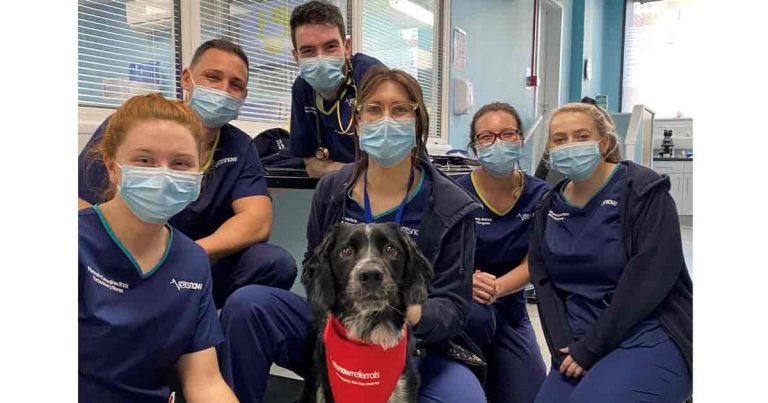7 Dec 2022
Vets at a Glasgow hospital have used a cutting-edge treatment to save a one-year-old dog that had previously undergone nine separate blood transfusions.

Riley with the Vets Now team in Glasgow. Image: © Vets Now.
A Scottish hospital has used a rare treatment to save a one-year-old dog from an unusual blood condition.
Riley, a springer spaniel and border collie-cross, has now made a full recovery following several days in intensive care at the Vets Now emergency unit in Glasgow, followed by six months of further medication.
The team used a technique known as therapeutic plasma exchange to tackle his case of immune-mediated haemolytic anaemia, after his condition continued to worsen despite nine blood transfusions.
The illness was confirmed following tests carried out at The Royal (Dick) School of Veterinary Studies in Edinburgh after Riley was referred there by his local practice, Tay Valley Vets in Perth.
During the journey to Edinburgh, two separate vets had to be put on standby in case he suffered a seizure.
Vets Now critical care specialist vet Neus Elias said: “Therapeutic plasma exchange is a technique where a patient’s blood is processed to separate the components of the cells from the plasma, so as to remove the harmful components.”
Dr Elias added: “This technique has only been used twice before in Scotland for this disease, and once before for a different disease.
“Over the course of six hours, we slowly processed three pints of Riley’s blood.
“The watery portion of the blood was discarded and Riley was then transfused with an equal volume of plasma products to replace this, from healthy dog donors. The washed-out cells were then transfused back to him.”
Within five days of the procedure, Riley was well enough to leave the hospital, but he still had to avoid other dogs and undergo six months of further medication because of the risk of further infection. He will also need continuing blood checks.
Dr Elias added: “We all remember Riley, he was such a loveable character and such a challenging case, and we’re just so delighted he’s made such a great recovery.
“His case really does show that even in the bleakest of situations, there can often be hope for your pet.”